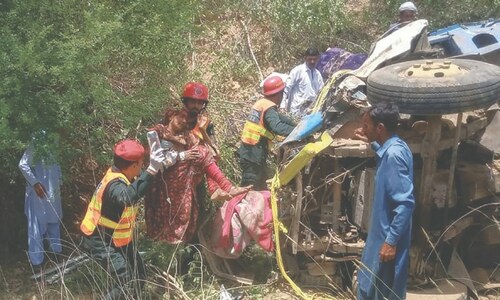
ISLAMABAD, Jan 6: Prime Minister Mir Zafarullah Jamali said on Tuesday that Saarc had taken a positive approach to its problems , expressing the hope for "better results in due course of time".
Addressing a press briefing after the conclusion of the 12th Saarc summit, Mr Jamali said "the political irritants, whatever they were in the last few years, need to be set aside if Saarc has to progress as a region, not as individuals. Ours will be a positive approach".
While the premier focused his responses on Saarc, Pakistan's bilateral issues with India kept cropping up. Asked about the prospects of the "new start" that Pakistan and India were taking, he expressed the hope that the two countries would make progress now.
He said the two countries had made a new beginning after Agra, adding: "It's only when leaders sit together they can talk about the issues confronting them".
He said landmark decisions had been taken and "new thoughts and new contents have been added to broaden and deepen the scope of multi-dimensional cooperation in South Asia."
Mr Jamali said considering the fact that the Saarc process had been repeatedly interrupted "success achieved has been remarkable". He said there was a realization to take a holistic approach that encompassed the entire spectrum of inter-state relations in South Asia. He believed that political disputes could not be divorced from economics, adding that imperatives of geo-economics could no longer be ignored either.
"The creation of a climate of peace and stability, and resolution of differences and disputes and simultaneous building of economic synergies could transform the daily life of people," he added.
Asked if the additional protocol on terrorism would settle the differences on the issue, he said "when the seven leaders of the region sit together, they can try to find a solution to combat it."
Mr Jamali said India and Pakistan had fairly good idea where they wanted to go now. Though it is too early to say it yet, he observed, "the two sides seem to have made up their minds to head in a positive direction."
The leaders, he said, had discussed a number of issues through the framework of Saarc. In reply to a question about the Saarc being slow in making progress, Mr Jamali said a mechanism had been evolved and the concerned standing committees had been activated. A group would be set up to report progress in this regard, he added.
Asked when he would visit India, the prime minister replied, "whenever I am asked to". He was quick to add that in his capacity as chairman of Saarc he would like to visit all the member states.
He termed the Indian offer to provide funds for alleviating poverty "a good start," while holding out the assurance that "Pakistan will not lag behind and will make a decent contribution".
About the proposed gas pipeline from Iran to India through Pakistan, Mr Jamali said he had discussed the issue with Prime Minister Atal Behari Vajpayee. Pakistan, he added, was self-sufficient in natural gas. "Perhaps India requires it more than Pakistan," he said, adding, "the ball is now in Indian prime minister's court."
He denied there had been any foreign pressure to "talk it out with India." He said he was confident that "all of us realize our responsibility towards our national interest, which always come first."
Answering a question about the possibility of having a common currency, he said: "It wouldn't be viable for both Pakistan and India at this moment." About the proposal of celebrating the 150th anniversary of the 1857 war of independence together with India and Bangladesh, he said, "it is food for thought, we will consider it. There are different connotations of it in India and in Pakistan. We will try to study and see if it can be worked out."
The Saarc leaders, he said, had expressed the desire to promote peace, stability, amity and progress in the region through adherence to the principles of the UN charter and the Non-Aligned Movement.
In the economic field, he pointed out, the leaders affirmed the determination to create an inclusive, just and equitable partnership for peace, development and prosperity. He said the leaders noted with satisfaction the progress made on Sapta (South Asian Preferential Trading Arrangement) and reviewed and signed the framework agreement on Safta (South Asian Free Trade Area).
The leaders, he said, had also agreed that a study on creating a South Asian Energy Cooperation, including the concept of an Energy Ring, should be undertaken by the Saarc's working group on energy.
"We also agreed on giving attention to the need for harmonization of standards, simplification of customs procedures, as well as cooperation among the central banks."
He said the leaders were of the view that public and private sector cooperation, particularly joint ventures, held great promise. Mr Jamali described the signing of the Social Charter as a historic development.














































Dear visitor, the comments section is undergoing an overhaul and will return soon.